Jack Kerouac and his Great Works Jack Kerouac is known by many as the Beat Generation author of On the Road and other classics that celebrate an adventurous lifestyle, which liberates from society. While seen by most people who read his books as someone who lives a rugged individual life, but in truth, he was a man torn by alcohol and troubled sexuality. In addition to Kerouac's experiences with alcoholism and confused sexuality, his inspiration, Fitgerald, inspired him to create the well-known work On the Road, which him great recognition and respect.
Jack Kerouac born in Lowell, Massachusetts, March 12, 1922, a product of the Jazz Age. His Father, Leo Alcide Kerouac, was a printer, businessman and gambler who put his family in poverty and made them suffer. Leo Kerouac originated from Quebec, Canada, where his father owned a carpentry business. Kerouac looked upon his father with shame and disappointment.
Kerouac's mother, Gabreielle Ange C'Evesque, a housewife, also originated from Quebec. Kerouac's mother always encouraged him to do well in school and took care of the family, even when times were rough.
Kerouac had two siblings, Gerard his older brother and Caroline his older sister. When Kerouac was only four, his brother Gerard died at the age of nine, of purpum hemorragica, an uncontrollable internal bleeding. Gerard's death greatly effected Kerouac and his family and eventually had a great impact on his writing. Kerouac was four years old in 1926 when his family went "crazy", he later wrote in the 88th Chorus of Mexico City Blues. That was the year that Gerard died. The strange experiences of his last days, conveyed to Kerouac over the years by his mother, had an enormous impact on Kerouac's work and marked the beginning of what he called his "immortal idealism" (Amburn 12).
In 1928, Kerouac, now six years old, enrolled at Saint Louis-de-France parochial school in Lowell, Massachusetts. His teachers were nuns, who assigned him bible versus frequently. Later he moved to Bartlett Junior High, at the age of eleven, and entered the seventh grade. He walked half a mile from Pawtucketville, an exclusively French part of Lowell, to the Junior High, which was predominantly Irish and Greek.
Billy Chandler, a friend of Kerouac who walked home with him after school, enjoyed art and encouraged Kerouac to write his first narrative and begin drawing graphic art. One long afternoon at Billy's house, they created a cartoon tale of Guatemalan jungle adventures.
Another friend of Kerouac's was Sebastian Sampas, or Sammy. He was the most intellectually similar person Kerouac met at Bartlett High. Sammy Sampas was very important in the life of Kerouac and he inspired him to become a writer. Kerouac later included Sammy as a character with different names in many of his important works, including the character of Alexander Panos in The Town and the City, Sebastian in Visions of Cody, Savas in Visions of Gerard, and Sabbas in Vanity of Duluoz.
Kerouac spent many hours in his room with his vivid imagination, imagining horse races and baseball games. His mother worried that he spent too much time alone and urged him to go outside and find new friends. "This led to his involvement in real sports, particularly football, which came to dominate his life for the next decade" (Amburn 19). He met a robust group of boys from Pawtuckville, and developed athletic skills during long summer afternoons, playing football and baseball. Kerouac and the group of boys would eventually form the key players of the Bartlett Junior High football team.
At the age of fourteen he entered Lowell High in Lowell, Massachusetts. In high school he had an English teacher, Mr. Pine, whom he praised and admired. He was grateful to Pine for encouraging his interest in authors Thoreau, Dickinson, and William Blake. While in high school he was often absent, as Chiungos, a friend, put it, " I do not know how he could have maintained a 84 average if he was not attending school"(Gifford and Lawrence 106).
During his senior year on the varsity football team Coach Keady used Kerouac as his secret weapon to win the championship. In the last few games of the season Kerouac was afraid he would not be noticed by colleges and given a scholarship, but on the last game of the season he performed superbly and was noticed by Columbia, Duke, and B.C. who vied for Kerouac. Of the three colleges who offered Kerouac a full scholarship, he chose Columbia. B.C. was so furious with Kerouac's decision that they had Kerouac's father fired from the printing business, Jack's excitement of attending a big college was replaced with guilt. "If I had chosen more wisely on the college of which I should have attended my father would not have had to suffer the loss of his job" (Kerouac qtd. in Dofner 56).
In the fall Kerouac was a freshman at Horace Mann, a extension of Columbia College in New York and the city was opened up to him. "As soon as I stepped out of the subway I saw a street filled with hookers, con men, and dope addicts" (Kerouac qtd. Grefrath 72). He hired a hooker in Times Square and had sexual intercourse with her in a side-street hotel. One of the friends Kerouac met at Horace Mann was a jewish boy named Seymour Wyse, who would come to have one of the most transformative impacts on him. Seymour introduced him to Ernst Hemingway and the glories and joys of jazz. "He enjoyed writing poetry with Seymour and discussing the great literature of Dickinson, Thoreau, Jack Wolfe, and Jack London" (King 24).
In Kerouac's sophomore year he played for the Columbia varsity football team leading the way to victory in many of their games. The Columbia football team was to be the most watched and most promising football team in the state of New York that year. Kerouac had been perusing a Norwegian girl who worked at the same dinning hall as he did. They had a 12 hour date one night and she convinced him to read The Great Gatsby, one of the well known novels by Fitzgerald. The Great Gatsby would inspire him to write his novel, Thomas Mann.
One night in the summer after his sophomore year, Kerouac had gotten so drunk that he fell into a swimming pool. If it had not been for Sammy, he would have drowned. "I was terribly disappointed in my actions of drinking and making a fool of myself, because it cost me a relationship with a girl and embarassment." (Kerouac qtd. in Mortenson 24) Kerouac's drinking problem became quite serious, for he was drinking on an almost nightly basis.
Before returning to Columbia, he helped his parents, unable to find a job in Lowell, move to West Haven, Connecticut where they found a cottage for forty dollars a month. His father then ran a hot-lead linotype printing machine in New Haven while his mother cleaned tables at a hash joint.
When he returned to Columbia, he clashed immediately with Lou Little, his football coach, who complained that Kerouac was no longer fast enough for the starting lineup. "I found Kerouac promising but head strong" (Little qtd. in Gifford and Lawrence 145). Furious over spending a season on the bench, Kerouac stomped off the field and dropped out of Columbia the next day.
After Kerouac dropped out of College, he got on a bus and departed for Washington D.C. where he got a job as a construction worker for the Pentagon. There he earned sixty dollars an hour, but was fired two months after he was hired for excessive drinking. After his father died from excessive drinking, he began to write his first work, The Town and the City. Shortly after that he fell in love with and married Edie Parker in Washington. Their marriage only lasted a few months and they divorced.
In 1947, he met Neal Cassidy, a man who would be his life long friend and occasional lover. He also met Allen Ginsberg, who would take him across the country along with Neal. This trip would inspire Kerouac to write his most famous novel, On the Road.
Soon after he had returned from his road trip, he married Joan Haverty. The marriage was basically based on sex and did not last long because Kerouac's mother could no get along with her. Joan eventually packed her bags and left.
Kerouac took off on another trip across the country and composed Visions of Cody, Dr. Sax, Maggie Cassidy, and The Subterraneans during the five year journey around the country. Kerouac became a serious drunk and settled down in St. Petersburg, Florida with his new wife Stella Stampas, Sammy's sister and Kerouac's childhood friend. They lived together until his death. Kerouac died in St. Petersburg on October 21, 1969 due to cirrhosis of the liver.
Kerouac's novels are somewhat autobiographical, they are based on his experiences during his life. They tell the stories of his life and the people he met through different characters. Each character in his novels represents a different person he interacted with during his life. The major works he created during his life time are The Town and The City, On The Road, Visions of Cody, Dr. Sax, Maggie Cassidy, and The Subteraneans.
The work that Kerouac is most famous for is On The Road. The work is based on a reckless man named Dean Moriarty and a young writer named Sal Paradise, who begin three years of restless travel back and fourth across the country. With a combination of bus rides and hitchhiking, Sal is able to travel the country as he had always dreamed of doing to inspire him to write short stories and works. Their three-year travels bring them to different destinations such as Denver, L.A., San Francisco, New Orleans, and Mexico City. "LA. I loved the way she said "LA"; I loved the way everybody says LA on the Coast; it's their one and only golden town when all is said and done" (Kerouac On the Road 84). "From the dirty snows of 'frosty fagtown New York' all the way to the greeneries and river smells of old New Orleans, at the washed out bottom of America" (Kerouac On the Road 134). Even though Sal cares for people more than Dean does, their journeys across the country bring them closer together and shows them that they have a lot more in common than they first conceive. "You have absolutely no regard for anybody but yourself and your damn kicks. All you think about is what is hanging between your legs and how much fun or money you can get out of people and then just throw them aside. Not only that your silly about it. It never occurs to you that life is serious and there and there are people trying to make something decent out of it instead of just goofing all the time" (Kerouac On the Road 194).
Kerouac was recognized for his book, On the Road, as the most influential author of the Beat Generation. The book gave voice to a rising, dissatisfied generation of young people in the forties, fifties and even today. Though it has been fifty years since On the Road was written, the feelings, ideas, and experiences in the novel are still remarkable. The novel idealizes youth who long for a prosperous society.


